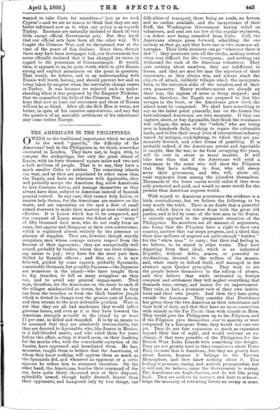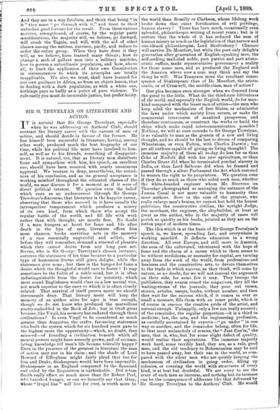THE AMERICANS IN THE PHILIPPINES.
OWING to the traditional importance which we attach to the word "guerilla," the difficulty of the Americans' task in the Philippines is, we think, somewhat overrated in London. They have not, to begin with, to conquer the archipelago, but only the great island of Luzon, with its forty thousand square miles and two and a half millions of people. That is to say, they have a much smaller Cuba to subdue. The remaining islands can wait, and as they are populated by other races than the Tagals, and have no relations with Aguinaldo, they will probably accept the American flag, allow Americans to levy Customs duties, and manage themselves as they always have done, subject to American instead of Spanish general control. In any case, they cannot help Luzon, or receive help thence, for the Americans are masters on the water, and are organising on the spot a fleet of small armed steamers to make their mastery at once visible and effective. It is Luzon which has to be conquered, and the conquest of Luzon means the defeat of an army " cf fifty thousand dark men, who do not really form an army, but appear and disappear at their own convenience, which is regulated almost entirely by the presence or absence of supplies. They are, however, though strictly irregulars, men whose courage extorts respect from the bravest of their opponents ; they are unexpectedly well armed, probably by traders, whom they use their remain- ing means to pay ; they have for the most part been drilled by Spanish officers ; and they are, it is now believed, guided by some experts, probably Spaniards, conceivably Germans, but possibly Japanese—the Japanese are numerous in the island—who have taught them to dig trenches, to kill as many stragglers as they can, and to avoid any general engagement. They wait, therefore, for the Americans on the route to each of the villages misdescribed as towns, fire as often as they can from the trenches or from the thick bamboo jungle which is dotted in clumps over the greater part of Luzon, and then retreat to the next defensible position. Were it not that they are all bad marksmen they would inflict grievous losses, and even as it is they have lowered the American strength actually in the island by at least 15 per cent. in killed and wounded. It is by no means to be assumed that they are absolutely irreconcilable, but they are devoted to Aguinaldo, who, like Juarez in Mexico, is a full-blooded native, and who ruled them for years before this affair, acting, it would seem, on their loathing for the monks who, with the remarkable exception of the Jesuits, have oppressed and humiliated them. He has, moreover, taught them to believe that the Americans, of whom they know nothing, will oppress them as much as the Spaniards did, and whenever an opponent or a critic appears he orders him to summary execution. On the other hand, the Americans, besides their command of the sea, have quite thirty thousand men at their disposal, splendidly armed, though badly dressed, braver than their opponents, and hampered only by two things, the difficulties of transport, there being no roads, no horses, and no coolies available, and the inexperience of their Staff, the Washington Government having relied on volunteers, and sent out too few of the regular regiments, —a. defect now being remedied from Cuba. Still, the Americans always press forward, rebuilding the one railway as they go, and they have one or two immense ad- vantages. Their little steamers can go " wherever there is dew " ; they penetrate into all the creeks, making retreat often very difficult for the insurgents ; and nothing can withstand the rush of the American volunteers. They care nothing about numbers, they are indifferent to losses, and they are man for man the superiors of their opponents; so they always win, and always reach. the objects of attack, rubbishy villages which the insurgents burn, to the irritation alike of the invaders and of their own peasantry. Heavy reinforcements are already on their way, the ingress of arms is being stopped; and unless, therefore, the Tagals are prepared to live like savages in the bush, or the Americans grow tired, the island must be conquered. We shall have something to say on the latter point presently, but on the former the best-informed Americans are very sanguine. If they can capture, shoot, or buy Aguinaldo, they think the resistance will collapse, the mass of the "rebels," who are losing men in hundreds daily, wishing to regain the culturable lands, and to live their usual lives of intermittent industry varied by intrigue, cock-fighting, to which they are pas- sionately devoted, and other forms of gambling. It is probable indeed, if the Americans persist and Aguinaldo is caught, that the war, so far from occupying five years, will be over in about as many months. It will take less than that if the Americans will send a statesman to the scene who will show the Filipinos that they have nothing to fear, who will sweep away their grievances, and who will, above all, raise regiments from among the islanders themselves. Thousands of the lower castes would enlist if they were only protected and paid, and would no more revolt for the present than American negroes would.
With regard to American persistence the evidence is a, little contradictory, but we believe the following to be very nearly the truth. There is no doubt that a powerful party, which draws its voters from both the great old parties, and is led by some of the best men in the States, is entirely opposed to the permanent retention of the Philippines. Its members use all manner of arguments, one being that the Filipinos have a right to their own country, another that war stops progress, and a third that their nine millions of negroes are quite enough " burden " for the " white man " to carry ; but their real feeling is, we believe, to be stated in other terms. They hate departing from their ideal, which is an industrial Republic, without debts, armies, or powerful in- dividualities, devoted to the welfare of the masses, and, while ready to defend itself, still managed in the abstract upon Quaker principles. They wish to see the people devote themselves to the reform of abuses, and they believe that while interested in foreign conquest and settlement they will neglect everything that demands time, energy, and money for its improvement. They take, in fact, a pessimist view of their own institu- tions and their own people. And then they hate going outside the Americas. They consider that Providence has given them the two Americas as their inheritance and their field of duty, and that they have no more connection with islands in the Far Pacific than with islands in Mars. They would give the Philippines up to the Filipinos, and if the Filipinos gave themselves over to anarchy or were conquered by a European State, they would not care one jot, They do not fear expansion so much as expansion beyond their line of sight, and would welcome an ex- change, if that were possible, of the Philippines for the British West India Islands with something like delight. They are not greatly hurt in their consciences about Porto Rico, because that is American; but they are greatly hurt about Luzon, because it belongs to the Eastern Hemisphere, and they know nothing about it. This feeling is genuine, strong, and actively propagandist, but it will not, we believe, cause the Government to retreat. The Americans are Anglo-Saxons, and do not like going back. They are soldiers by iustiuct, and hate to acknow- ledge the necessity of retreating before an enemy in arms. And they are in a way fatalists, and think that being "in it" they must " go through with it," and trust to their unbroken good fortune for the result. From these various motives, strengthened, of course, by the regular party considerations, the majority will, we believe, go forward, will crush the Tagals, and will, with the aid of other classes among the natives, garrison, pacify, and reduce to order the entire group. When they have done it they will, as we believe, have learned many things ; how to change a mob of gallant men into a military machine, bow to govern a subordinate population, and how, above all, to limit the application of their own Constitution in circumstances to which its principles are totally inapplicable. We also, we trust, shall have learned for our own guidance in Africa, as from an object lesson, that in dealing with a dark population, as with a white one, nothings pays so badly as a policy of pure violence. To rule easily you must do inexorable justice, but prefer lenity.







































 Previous page
Previous page